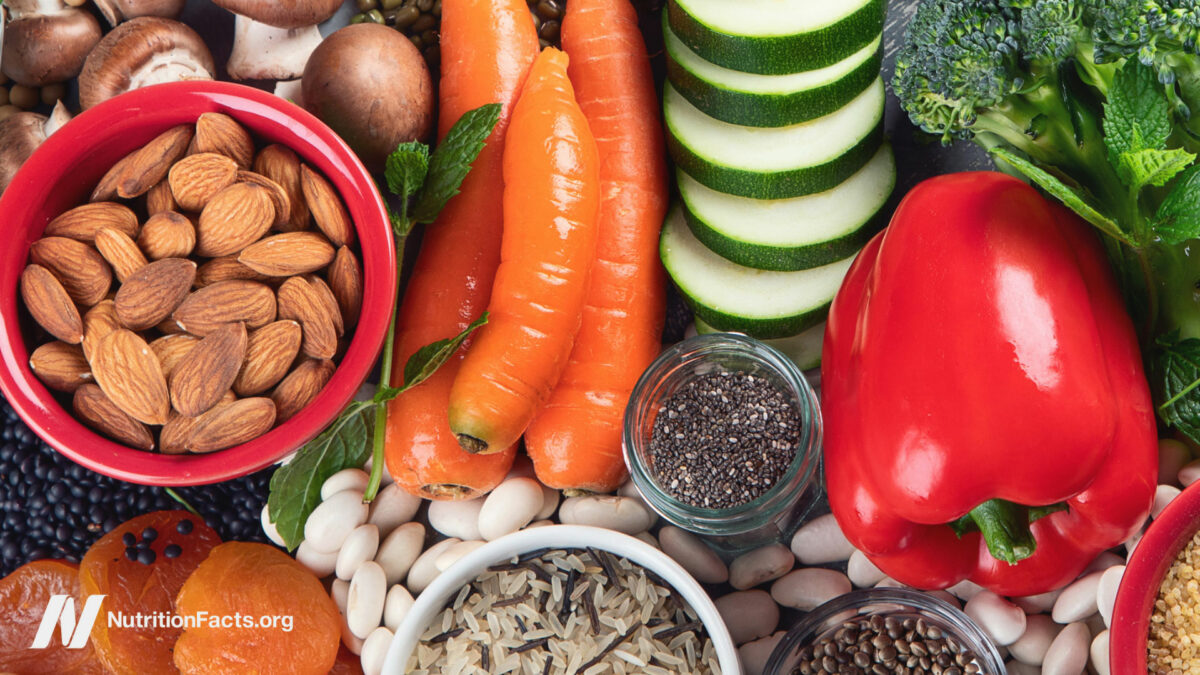
Fasting
Fasting is the practice of abstaining from food for a period of time, while caloric restriction is a dietary regimen that simply reduces caloric intake. The greatest caloric restriction is no calories at all. Fasting has been branded the “next big weight loss fad” but has a long history throughout various spiritual traditions, practiced by Moses, Jesus, Muhammed, and Buddha. Today, about one in seven American adults report using some sort of fasting as a means to control body weight.
Rather than cutting calories day in and day out, what if, instead, you just ate as much as you wanted every other day? Or for only a few hours a day? Or what if you fasted two days a week or five days a month? These are all examples of intermittent fasting regimens, which I cover in my book How Not to Diet, and they may even be the way we were built to eat. Three meals every day may be a relatively novel behavior for our species. For millennia, our ancestors often may have consumed only one large meal a day or went several days at a time without food.
Intermittent fasting is often presented as a means of stressing our bodies—in a good way—and some forms may be safe and effective (and it’s safe to say cost-effective when it comes to your grocery bills), but apparently no more so for weight loss than continuous caloric restriction. However, combining intermittent-fasting regimens, such as early or midday time-restricted feeding with a healthier diet during the feeding windows, may prove to be particularly powerful. The weight may be worth the wait.
Our fasting for weight loss infographic compares the advantages and disadvantages of different types of fasting based on the latest evidence.
For substantiation of any statements of fact from the peer-reviewed medical literature, please see the associated videos below.
Popular Videos for Fasting


Fasting-Mimicking Diet Before and After Chemotherapy
How might we replicate the protective effects of fasting with food?
Fasting Before and After Chemotherapy Put to the Test
Do the benefits of short-term fasting during cancer therapy found in the lab translate into...
Fasting for Cancer: What About Cachexia?
What did randomized controlled trials find as the effects of supplemental feeding on clinical outcomes?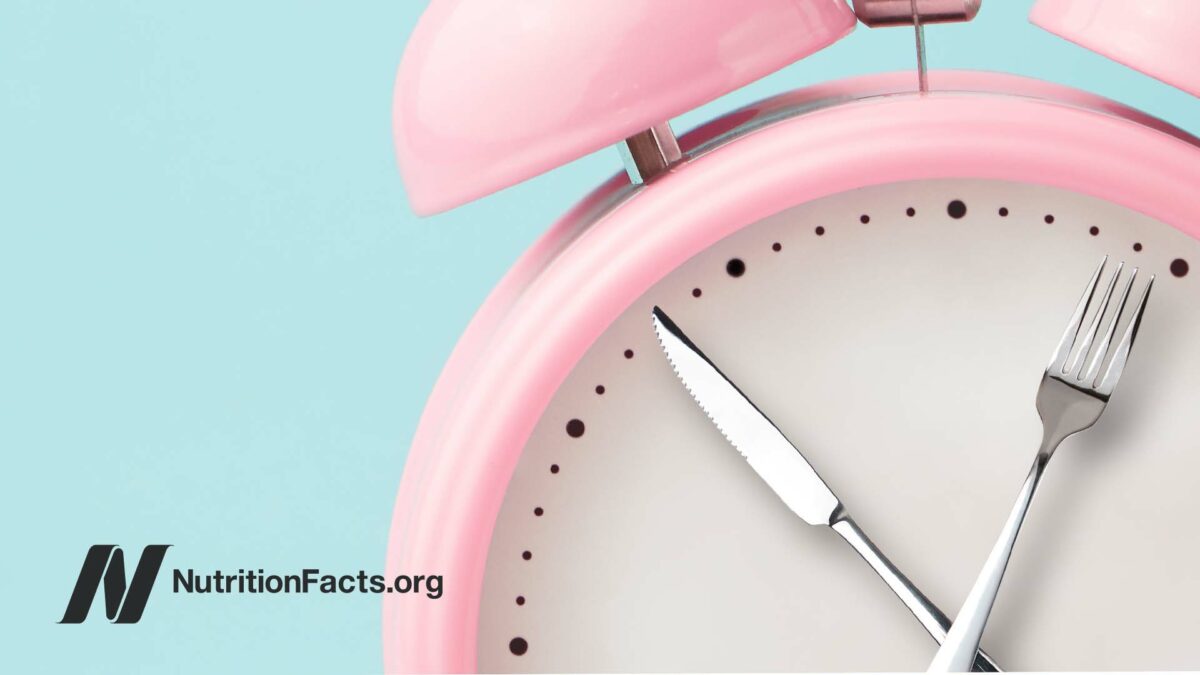
Fasting to Reverse Diabetes
By losing 15 percent of their body weight, nearly 90 percent of those who’ve had...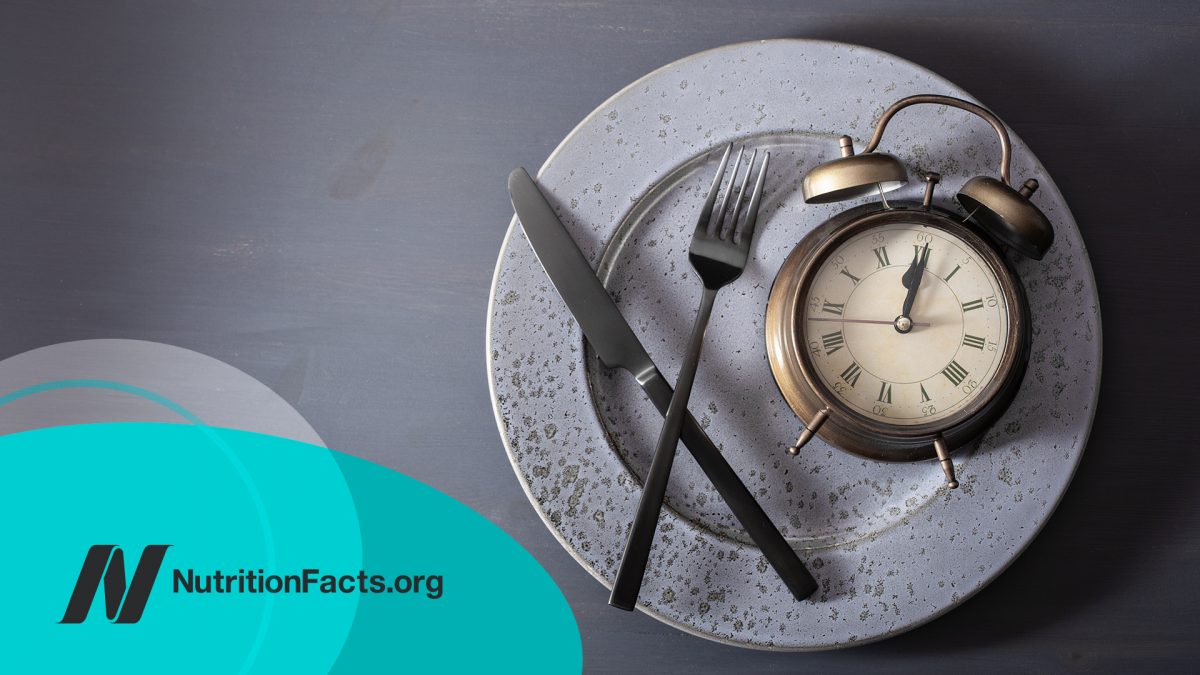
Fasting to Treat Depression
Caloric restriction can boost levels of brain-derived neurotrophic factor (BDNF), considered to play a critical...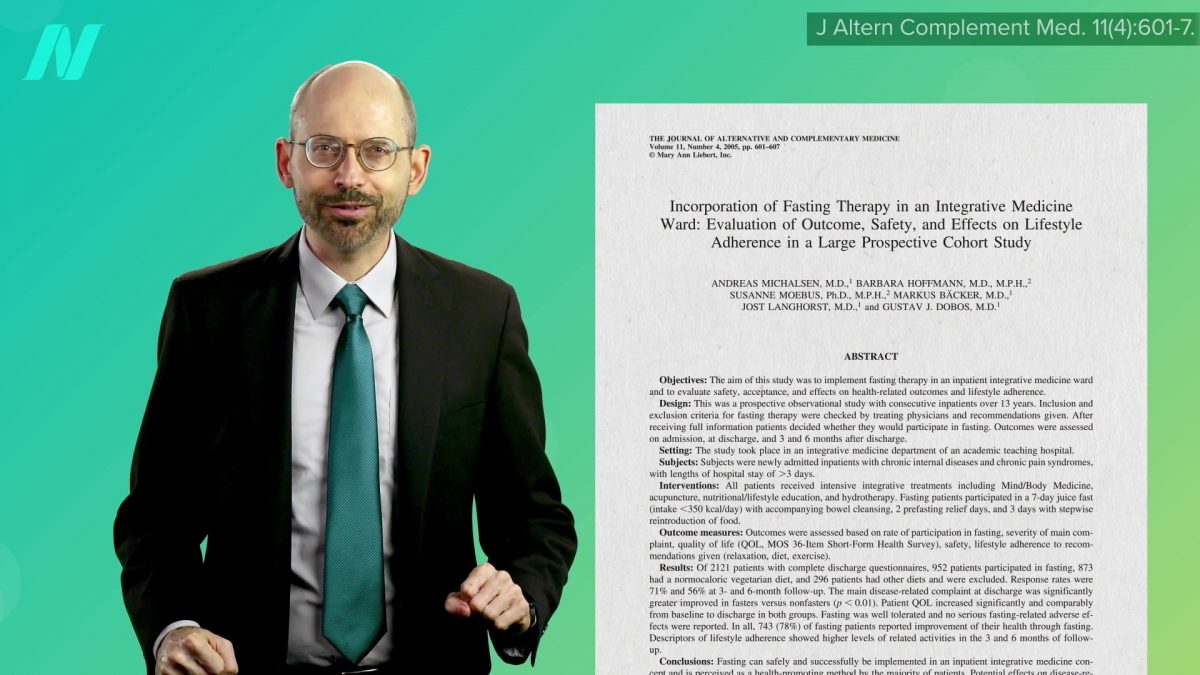
The Benefits of Fasting for Healing
Where did the idea of therapeutic fasting come from?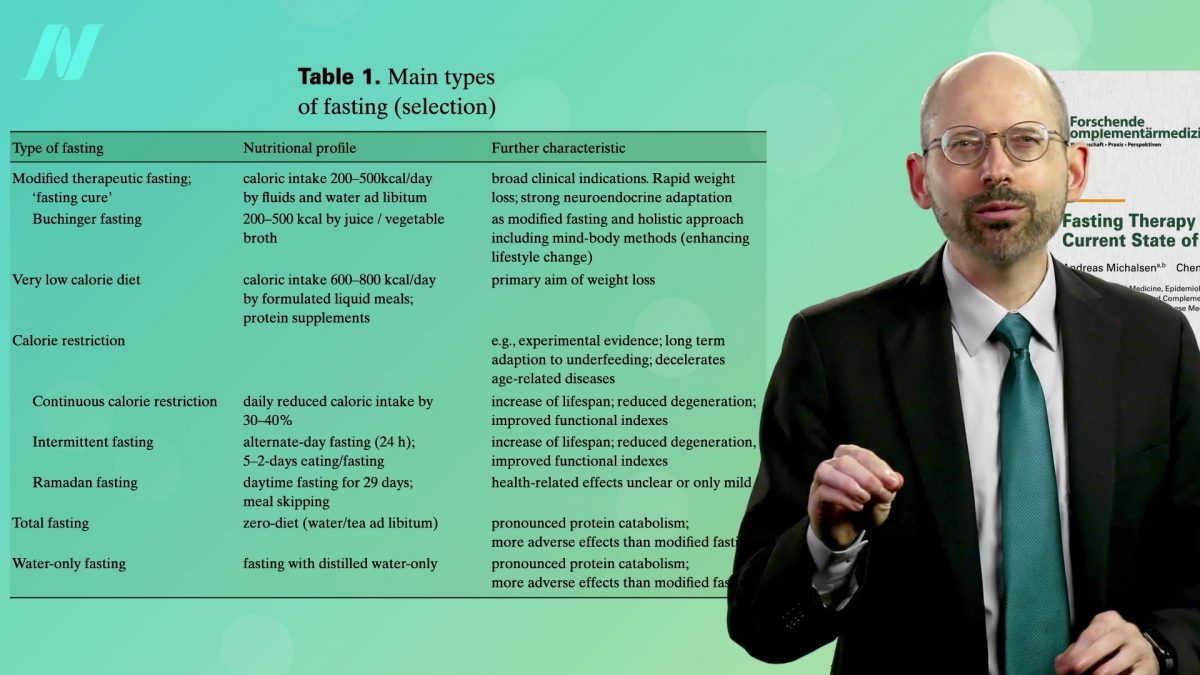
The World’s Largest Fasting Study
Buchinger modified fasting is put to the test.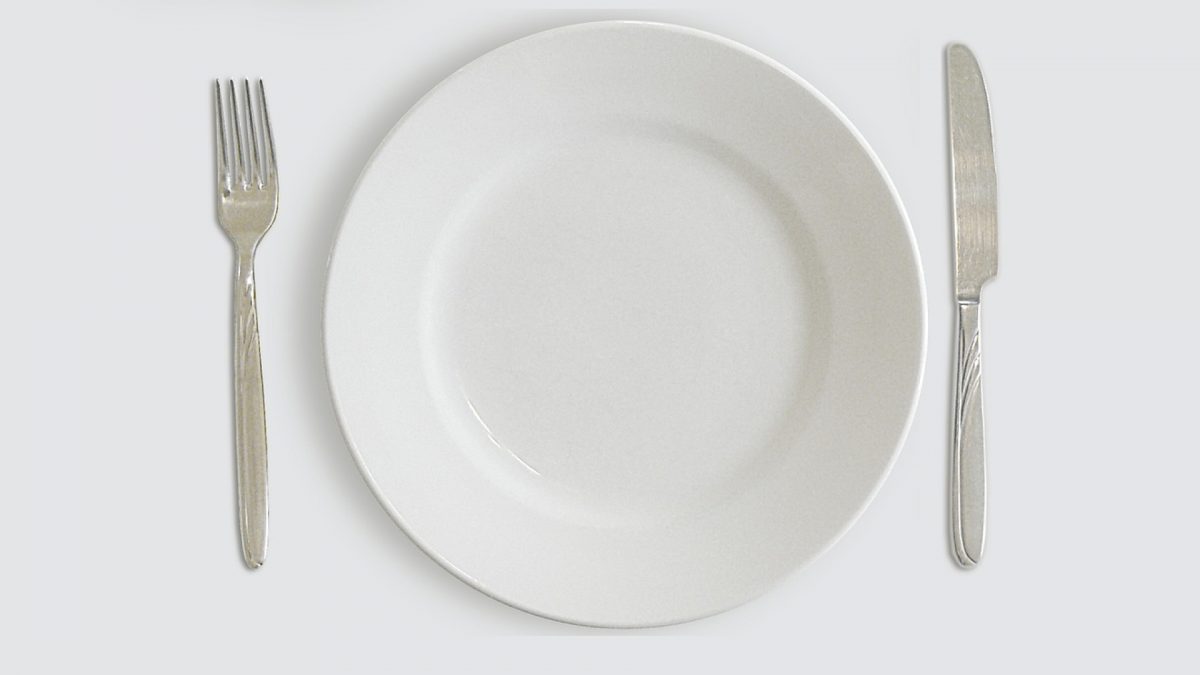
Is Fasting Beneficial for Weight Loss?
Fasting for a week or two is like the keto diet—it can actually slow body...
Is Fasting for Weight Loss Safe?
The reasons why fasting longer than 24 hours, and particularly three or more days, should...
Is Alternate-Day Intermittent Fasting Safe?
Eating every other day can raise your cholesterol.
Does Intermittent Fasting Increase Human Life Expectancy?
Alternate-day modified fasting is put to the test for lifespan extension.
The Benefits of Early Time-Restricted Eating
Calories eaten in the morning count less and are healthier than calories eaten in the...
How to Lower Blood Pressure Naturally with Lifestyle Changes
The effect of fasting to lower blood pressure compared to medications, cutting down on alcohol,...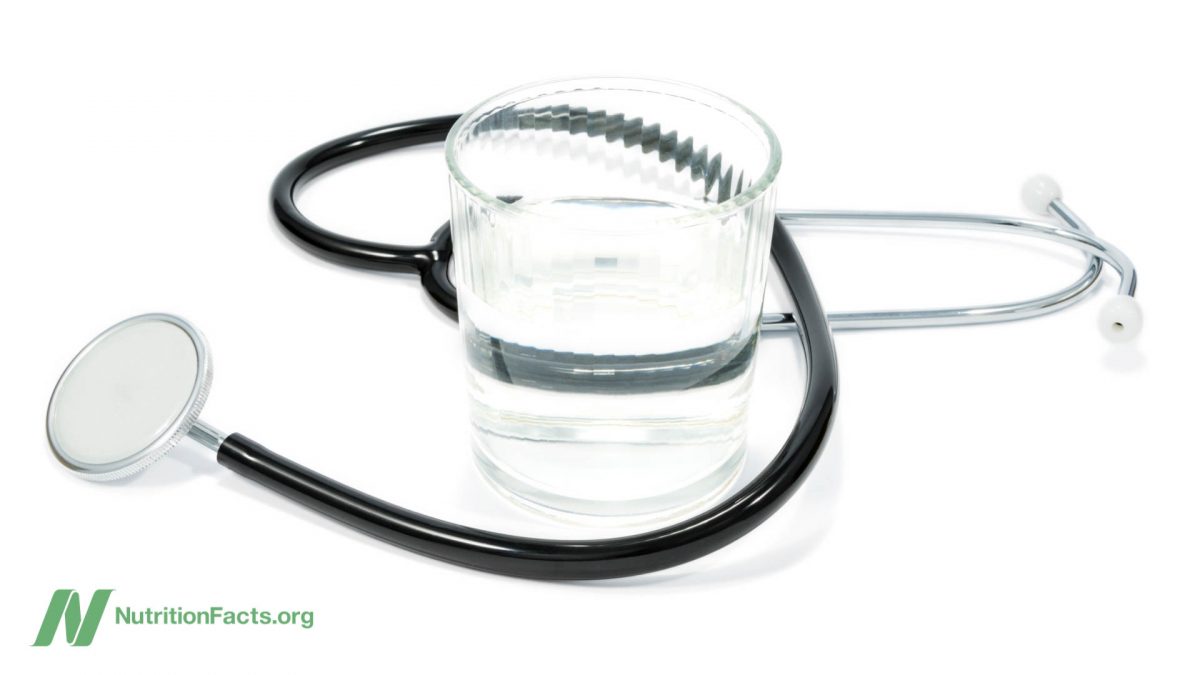
Fasting to Naturally Reverse High Blood Pressure
A whole food plant-based diet can be used to help lock in the benefits of...All Videos for Fasting
-

How Not To Age – Live Presentation
In this live lecture, Dr. Greger offers a sneak peek into his latest book, How Not to Age, a New York Times Best Seller.
-

VSED: The Downsides of Fasting for Ending Life
What are the pros and cons of voluntarily stopping eating and drinking to end your life?
-

VSED: The Benefits of Fasting for Ending Life
Even under hospice with excellent palliative care, some spend their last months in uncontrollable suffering. What can be done in places in the United States that outlaw physician-assisted dying?
-

How to Die a Good Death
Hospice is often framed as “giving up,” but, ironically, hospice patients sometimes actually live longer
-

Fasting to Detox
How might we help flush the pollutants stored in our fat that come spilling out into our bloodstream during weight loss?
-

Spontaneous Regression of Cancer with Fasting
How can we naturally increase the activity of our cancer-fighting natural killer cells?
-

A Case of Stage 3 Cancer Reversal with Fasting
I go over a case report of water-only fasting, followed by a whole food, plant-based diet for follicular lymphoma.
-

Fasting-Mimicking Diet Before and After Chemotherapy
How might we replicate the protective effects of fasting with food?
-

Fasting Before and After Chemotherapy Put to the Test
Do the benefits of short-term fasting during cancer therapy found in the lab translate into the clinical setting?
-

Fasting Before and After Chemotherapy and Radiation
Might short-term fasting during cancer treatment minimize side effects while boosting efficacy?
-

Fasting for Cancer: What About Cachexia?
What did randomized controlled trials find as the effects of supplemental feeding on clinical outcomes?
-

How to Boost FGF21 with Diet for Longevity
Fasting and exercise can boost the longevity hormone FGF21, but what can we eat—or avoid eating—to get similar effects?
-

Life Extension with FGF21
What can we do to boost the longevity hormone FGF21?
-

Fasting to Reverse Diabetes
By losing 15 percent of their body weight, nearly 90 percent of those who’ve had type 2 diabetes for less than four years can achieve remission.
-

Fasting for Post-Traumatic Brain Injury Headache
What effect do fasting and a plant-based diet have on TBI and migraines?
-

Fasting for Irritable Bowel Syndrome
More than half of IBS sufferers appear to have a form of atypical food allergy.
-

How to Boost Brain BDNF Levels for Depression Treatment
Fasting and exercise can raise BDNF levels in our brain, but this can also be achieved by eating and avoiding certain foods.
-

Fasting to Treat Depression
Caloric restriction can boost levels of brain-derived neurotrophic factor (BDNF), considered to play a critical role in mood disorders.
-

Fasting for Autoimmune Diseases
Various fasting regimens have been attempted for inflammatory autoimmune diseases such as lupus, ankylosing spondylitis, chronic urticaria, mixed connective-tissue disease, glomerulonephritis, and multiple sclerosis, as well as osteoarthritis and fibromyalgia.
-

Fasting for Rheumatoid Arthritis
Fasting, followed by a plant-based diet, is put to the test for autoimmune inflammatory joint disease.
-

The World’s Largest Fasting Study
Buchinger modified fasting is put to the test.
-

The Benefits of Fasting for Healing
Where did the idea of therapeutic fasting come from?
-

Fasting to Naturally Reverse High Blood Pressure
A whole food plant-based diet can be used to help lock in the benefits of fasting to kickstart the reversal of high blood pressure.
-

How to Lower Blood Pressure Naturally with Lifestyle Changes
The effect of fasting to lower blood pressure compared to medications, cutting down on alcohol, meat and salt, eating more fruits and vegetables, or eating completely plant-based.
-

What the New Blood Pressure Range Guidelines Mean
Natural approaches to lowering high blood pressure can work better than drugs because you’re treating the underlying cause, and can end up having only good side effects.
-

How Circadian Rhythms Affect Blood Sugar Levels
The same meal eaten at the wrong time of day can double blood sugars.
-

Chronobiology – How Circadian Rhythms Can Control Your Health and Weight
Given the power of chronotherapy—how the same dose of the same drugs taken at a different time of day can have such different effects—it’s no surprise that chronoprevention approaches, like meal timing, can also make a difference.
-

Is Skipping Breakfast Better for Weight Loss?
Breakthroughs in the field of chronobiology—the study of our circadian rhythms—help solve the mystery of the missing morning calories in breakfast studies.
-

Is Breakfast the Most Important Meal for Weight Loss?
Is the link between breakfast skipping and obesity cause-and-effect?
-

The Benefits of Early Time-Restricted Eating
Calories eaten in the morning count less and are healthier than calories eaten in the evening.
-

Time-Restricted Eating Put to the Test
Are there benefits to giving yourself a bigger daily break from eating?
-

The 5:2 Diet and the Fasting-Mimicking Diet Put to the Test
The effects of eating only 5 days a week or a fasting-mimicking diet 5 days a month.
-

Evidence-Based Weight Loss – Live Presentation
In this live presentation, Dr. Greger offers a sneak peek into his book How Not to Diet.
-

Does Intermittent Fasting Increase Human Life Expectancy?
Alternate-day modified fasting is put to the test for lifespan extension.
-

Is Alternate-Day Intermittent Fasting Safe?
Eating every other day can raise your cholesterol.
-

Alternate-Day Intermittent Fasting Put to the Test
Does every-other-day-eating prevent the metabolic slowing that accompanies weight loss or improve compliance over constant day-to-day calorie restriction?
-

Is Fasting for Weight Loss Safe?
The reasons why fasting longer than 24 hours, and particularly three or more days, should only be done under the supervision of a health professional and preferably in a live-in clinic.
-

Is Fasting Beneficial for Weight Loss?
Fasting for a week or two is like the keto diet—it can actually slow body fat loss rather that accelerating it.
-

Benefits of Fasting for Weight Loss Put to the Test
For more than a century, fasting—up to 382 days without calories—has been used a weight-loss treatment.
